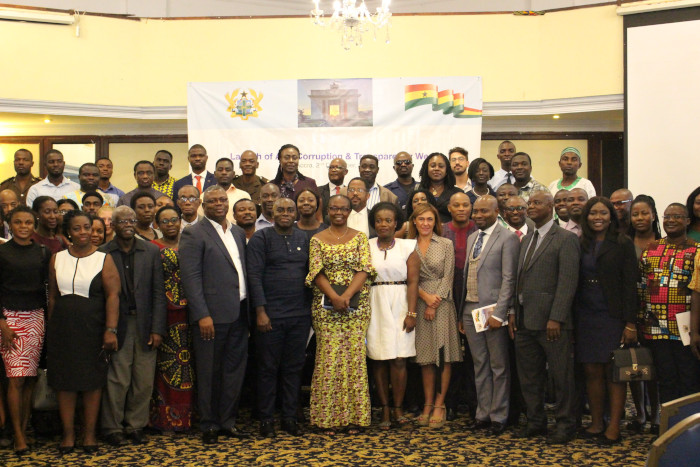-
12 December 2019
Category : Reportage
Ghana and FIIAPP together against corruption
9 December is International Anti-Corruption Day and ARAP Ghana, a project managed by FIIAPP, is accompanying Ghanaian institutions in their fight against this crime
 Group photograph from an event during Anti-corruption and Transparency Week in Ghana
Group photograph from an event during Anti-corruption and Transparency Week in GhanaINTERNATIONAL ANTI-CORRUPTION DAY
The United Nations has established 9 December as International Anti-Corruption Day. The purpose of this international day is for the media and the organisations involved to contribute to raising awareness of this problem among the public at large.
By corruption we mean “the abuse of power, of functions or means to obtain an economic or other benefit.” If we refer to the etymological origin of the Latin “corruptio”, we find that the original meaning of the term is “action and effect of breaking into pieces.” Corruption is a scourge which, as stated in the United Nations Convention against Corruption, approved on 31 October 2003, threatens the stability and security of societies and undermines justice. As its Latin root indicates, it “breaks apart” both the institutions and the ethical and democratic values of the societies that suffer from it.
In addition, it is a transnational phenomenon in which organised crime usually takes part, resulting in other types of crime such as trafficking in human beings and money laundering.
To combat it, it is essential to promote international cooperation and technical assistance and, for this international cooperation agents such as FIIAPP play a key role.
CORRUPTION IN GHANA
Corruption continues to be a problem that has permeated all sectors of Ghana’s society and economy. With its devastating effects, it impedes sustainable development and is a threat to human rights. It could be said that corruption has been identified as one of the main causes of poverty, deprivation and underdevelopment. In the particular case of Ghana, the prevalence of corruption has resulted in poor provision of services and a lack of access to other basic services such as health and education. Corruption is also a threat to Ghana’s democratic ideals, in particular the rule of law, justice and equality before the law.
According to the 2018 Transparency International Corruption Perceptions Index, Ghana ranks 78th out of 180 countries.
THE ARAP-GHANA PROJECT
The Accountability, Rule of Law and Anti-Corruption Programme (ARAP), funded by the European Union and implemented by FIIAPP, has been supporting the efforts of the Ghanaian government to reduce corruption for three years.
The aim of the project is to promote good governance and support national reform, in order to improve accountability and strengthen anti-corruption initiatives throughout the country. To this end, it works together with the relevant government institutions and other national strategic partners while at the same time improving accountability and respect for existing legal structures.
In addition, it acts as a support programme for the government in implementing the National Anti-Corruption Action Plan (NACAP), Ghana’s national anti-corruption strategy ratified by Parliament in 2014, which aims to create a democratic and sustainable Ghanaian society based on good governance and endowed with a high degree of ethics and integrity.
ANTI-CORRUPTION AND TRANSPARENCY WEEK
In light of this problem, from 2 to 9 December Accra, the country’s capital, held the Anti-Corruption and Transparency Week (ACT) in which the Government, the public and private sectors, academia, the media, civil society and the general public all took part. The week was organised by the Commission on Human Rights and Administrative Justice (CHRAJ) supported by the ARAP programme.
The purpose of ACT Week was to create a platform for assessing the impact of the NACAP in the first five years of its implementation and strengthening the commitment of the implementing partners in the remaining five years of the NACAP; to raise awareness among Ghanaians of the perverse effects of corrupt practices; to advocate for sustained collaboration and inter-institutional partnership in the fight against corruption as well as for the need to provide adequate resources to anti-corruption agencies; and to promote the use of international cooperation instruments in the fight against corruption.
The week included a large number of activities, both nationally and regionally. These included the international forum on money laundering and asset recovery, international cooperation in legal and other areas; the forum on integrity for youth; the NACAP high-level conference; the presentation of integrity awards; and the observance of international anti-corruption and human rights days.
The work of ARAP will continue not only during the week but every day until the end of the programme in December 2020, because the fight is not just for one week, but for every day of the year.
Text created with the collaboration of Sandra Quiroz, communication specialist of ARAP Ghana
The views and opinions expressed in this blog are the sole responsibility of the person who write them.






